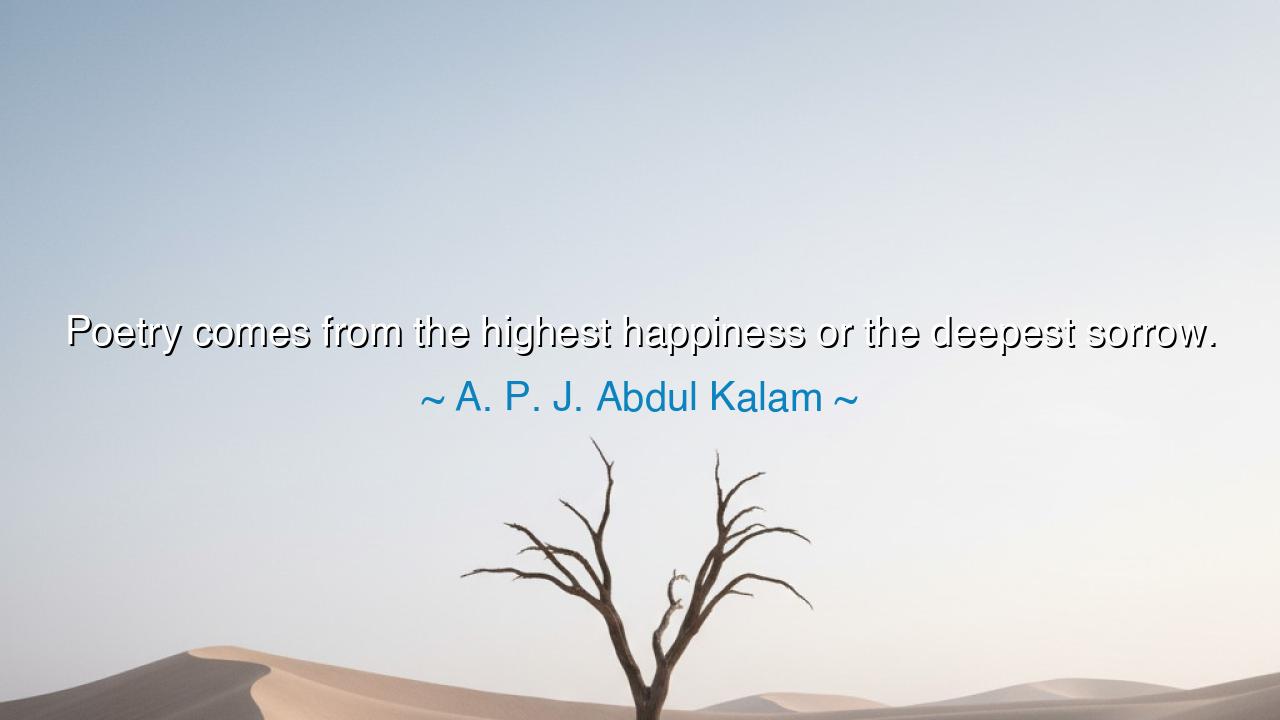
Poetry comes from the highest happiness or the deepest sorrow.






When A. P. J. Abdul Kalam said, “Poetry comes from the highest happiness or the deepest sorrow,” he spoke as one who understood not only the science of the stars, but also the language of the soul. His words rise from that sacred place where feeling becomes thought and thought becomes expression. In this simple truth, he revealed the eternal source of poetry—that it is born not of logic, nor of intellect alone, but of the most profound emotions that move the human heart. The poet is not merely a writer; he is a vessel through which the spirit speaks when joy soars beyond speech or when grief sinks too deep for tears.
Dr. Kalam, known to the world as the “People’s President” of India, was not only a scientist and a statesman but also a seeker of beauty. Though he built missiles and shaped the destiny of a nation, his heart was tender with wonder and compassion. He believed that poetry, like invention, is an act of creation born from passion—the outpouring of the human spirit when it touches the extremes of experience. When the soul stands at the summit of happiness or the abyss of sorrow, language itself is transformed; it becomes rhythm, music, and revelation. From these two emotional heights—the mountain of joy and the valley of pain—springs the art that endures through ages.
The ancients, too, knew this truth. The Greek philosopher Plato said that the poet is “a light and winged thing,” inspired not by reason, but by divine madness. The psalmists of Israel sang their praises and laments to God with equal fervor—one moment rejoicing in triumph, the next weeping over desolation. In both, the voice of the poet reached toward eternity. So also, Kalam’s words remind us that poetry is the language of the heart at its fullest measure. Whether one stands in the radiance of love or in the shadow of loss, poetry is the soul’s cry to make sense of the vastness within.
Consider Rabindranath Tagore, whose verses emerged from both radiant joy and crushing grief. His songs of the divine, like Gitanjali, were filled with the light of unity, born of deep spiritual happiness. Yet it was also sorrow—the loss of his beloved wife and children—that refined his music into something immortal. Out of his pain came understanding, and out of his joy came gratitude. Thus, Tagore became what Kalam described: a poet whose art rose from the extremes of feeling. His pen turned both ecstasy and anguish into eternal truth, showing that beauty often dwells where suffering and hope meet.
Kalam’s insight speaks not only to poets but to every soul that seeks meaning in life. For even those who never write a verse experience moments when emotion overwhelms reason—when the heart speaks in a language older than words. These moments, of triumph or tragedy, are the gateways to creation, compassion, and understanding. The same fire that drives a poet to write may move a teacher to inspire, a parent to nurture, a scientist to discover. For all great work—whether of art, faith, or invention—flows from the depth of feeling, from the union of happiness and sorrow that makes us human.
In this way, poetry is not limited to verse; it lives in every act touched by sincerity. When a man rejoices in his purpose, or a woman endures suffering with grace, there too is poetry. It is the song of life expressing itself through courage, through endurance, through love. Kalam reminds us that we must not fear deep feeling, for it is the wellspring of all creativity. To shut our hearts against sorrow is to close them also to joy; to avoid the storms of emotion is to forfeit the rain that nourishes the soul.
So, my children of thought and wonder, remember this teaching: welcome both your joys and your sorrows, for they are the twin flames that illuminate your path. Do not seek to silence your heart when it trembles with grief, nor to restrain it when it soars in delight. Instead, let those moments awaken creation within you. Write, speak, sing, or serve—whatever your gift, let it rise from feeling made holy by truth. For as A. P. J. Abdul Kalam taught, poetry—whether in words or deeds—is born from the highest happiness or the deepest sorrow. And in embracing both, we find the fullness of what it means to be alive.






AAdministratorAdministrator
Welcome, honored guests. Please leave a comment, we will respond soon